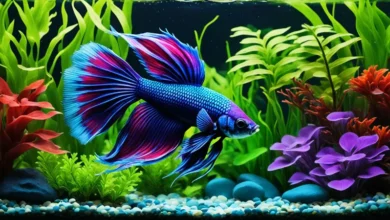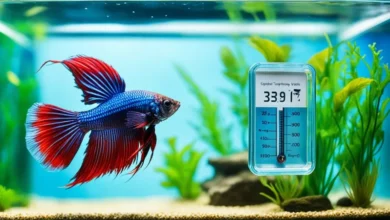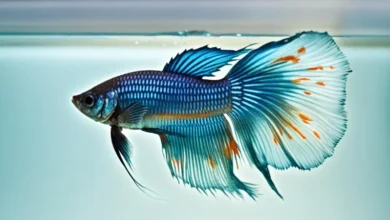
When it comes to keeping your betta fish healthy and happy, one of the most important factors to consider is their diet. Providing them with the right food is crucial for their overall well-being and can greatly impact their longevity. But with so many options available in the market, how do you choose the best food for your betta fish?
The ideal betta fish food should be nutritious, high-quality, and tailored to meet their specific dietary requirements. In this article, we will explore the different aspects to consider when selecting the best food for your beloved bettas. From understanding their dietary needs to evaluating food ingredients and exploring different types of betta food brands, we will cover everything you need to know to make an informed decision.
Understanding Betta Fish Dietary Requirements
Betta fish have specific dietary requirements that need to be met for optimal health. As carnivorous creatures, they require a diet rich in protein to thrive. In the wild, bettas feed on small insects, crustaceans, and other meaty foods, which form their natural diet.
To ensure the well-being of your betta fish, it is important to replicate their natural diet as closely as possible. This means providing them with high-quality foods that are protein-packed and resemble their natural prey. By doing so, you can help maintain their health, vibrant colors, and overall vitality.
However, protein is not the only essential component of a betta fish’s diet. In addition to protein, bettas also require a varied diet to ensure they receive all the necessary vitamins and nutrients. A varied diet helps prevent nutritional deficiencies and promotes overall well-being.
By offering a range of different foods, including pellets, flakes, and frozen or live foods, you can provide your betta with the variety they need. This ensures that they receive a balanced diet and obtain all the essential micronutrients for optimal health. A varied diet can also help stimulate their natural feeding behavior, keeping them mentally stimulated and happy.
| Key Points: | Importance |
|---|---|
| Betta fish require a diet rich in protein | Protein is essential for growth, coloration, and overall health |
| Bettas benefit from a varied diet | A varied diet ensures they receive all necessary vitamins and nutrients |
| Replicate their natural diet | High-quality foods that resemble their natural prey are recommended |
The Role of Live Foods in Betta Nutrition
Live foods are an essential part of a betta fish’s diet. They closely mimic the natural diet of bettas in the wild, providing them with the necessary nutrients for optimal health. Including live foods such as blackworms and brine shrimp in your betta’s diet can offer several benefits and enhance their overall well-being.
One of the key benefits of live foods is that they provide a more natural feeding experience for bettas. These foods offer mental stimulation and allow bettas to exhibit their natural hunting behavior. Watching your betta chase and consume live foods can be a fascinating sight while promoting their physical and mental exercise.
Live foods also offer superior nutrition compared to processed or dry foods. They are rich in essential proteins, vitamins, and minerals, which are crucial for betta fish’s growth, coloration, and reproductive health. By incorporating live foods into their diet, you can ensure that your betta receives a well-rounded and nutritionally balanced meal.
Another advantage of live foods is their ability to improve digestion in betta fish. Live foods are highly digestible and can aid in preventing issues like constipation and bloating. They promote a healthier gastrointestinal system and contribute to better overall betta health.
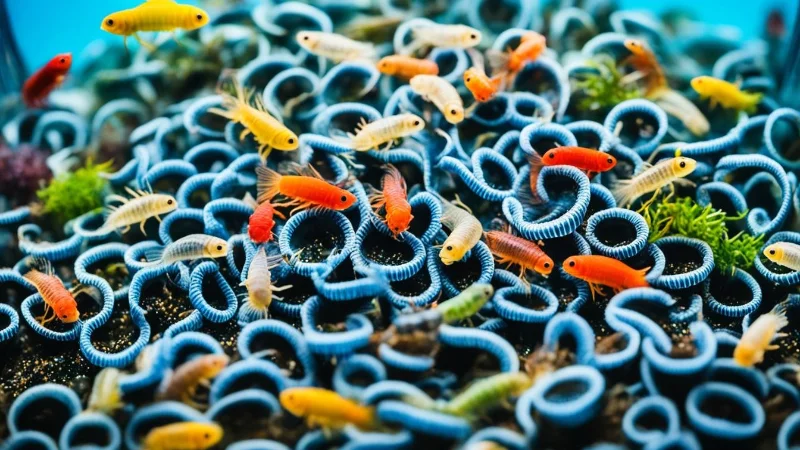
The inclusion of live foods in your betta’s diet can also help enhance their immune system. Live foods contain natural enzymes and probiotics that support a strong immune response, thus reducing the likelihood of illness and increasing their resistance to diseases.
Incorporating live foods into your betta’s diet does require some extra effort and care. It is essential to source these foods from reputable suppliers to ensure their quality and to avoid introducing harmful pathogens or parasites into your betta’s environment. Additionally, live foods should be supplemented with other high-quality betta fish food to provide a balanced and varied diet.
In conclusion, live foods play a vital role in the nutrition of betta fish. They offer numerous benefits, including mental stimulation, superior nutrition, improved digestion, and enhanced immune system support. By incorporating live foods like blackworms and brine shrimp into your betta’s diet, you can provide them with a more natural and nutritionally complete meal.
Betta Food: Selecting Top Quality Betta Pellets
Betta pellets are a popular and convenient option for feeding your betta fish. When choosing betta pellets, it’s important to evaluate the ingredients to ensure they promote optimal health.
Evaluating Ingredients for Optimal Health
When selecting top-quality betta pellets, it’s crucial to examine the ingredients list. Look for pellets that contain high-quality proteins such as krill or whole fish. These proteins provide essential nutrients that contribute to the overall health and well-being of your betta fish.
Did you know? High-quality proteins help support vibrant colors, healthy growth, and a strong immune system in betta fish.
In addition to proteins, it’s also beneficial to choose pellets that incorporate other nutritious ingredients like vitamins, minerals, and amino acids. These components support various physiological functions and ensure your betta’s overall nutritional needs are met.
Assessing Pellet Size and Buoyancy
When evaluating betta pellets, consider the pellet size and buoyancy to ensure they are suitable for your betta’s eating habits. Betta fish have small mouths, so it’s important to choose pellets that are easy for them to consume without choking or struggling.
Opt for pellets that are small enough to fit comfortably in your betta’s mouth, typically around 1-3mm in size. This ensures that your betta can consume the pellets without any issues.
Moreover, consider the buoyancy of the pellets. Betta fish are surface feeders, so it’s recommended to choose pellets that float on the water’s surface. This allows your betta to easily locate and consume the pellets, mimicking their natural feeding behavior.
By evaluating the ingredients, pellet size, and buoyancy, you can select top-quality betta pellets that provide the necessary nutrition for your betta fish. Remember, a healthy and well-balanced diet is key to keeping your betta fish happy and thriving.
Freeze-Dried vs Frozen Betta Fish Options
When it comes to betta fish food, there are two popular options: freeze-dried and frozen. Each option has its pros and cons, and it’s important to consider them before deciding on your betta fish.
Freeze-dried Betta Fish Food
Freeze-dried betta fish food offers convenience and a long shelf life. These foods are dehydrated and can be easily stored without the need for refrigeration. They are also lightweight and don’t require much space in your pantry or fish food storage area. However, it’s worth noting that freeze-dried food may lack some of the nutrients found in frozen food.
Frozen Betta Fish Food
Frozen betta fish food closely mimics the natural prey of bettas. These foods are typically made from whole fish, insects, or other aquatic organisms that are frozen to maintain their nutritional value. Frozen food provides a more varied diet for your betta fish and offers a closer approximation to their natural diet in the wild. However, it does require freezer space and needs to be thawed before feeding.
When deciding between freeze-dried and frozen betta fish food, consider the specific needs of your betta fish. If convenience and long shelf life are important to you, freeze-dried food may be the better option. However, if you want to provide a more natural and varied diet for your betta, frozen food is worth considering. You can also alternate between the two options to provide a balanced diet for your fish.
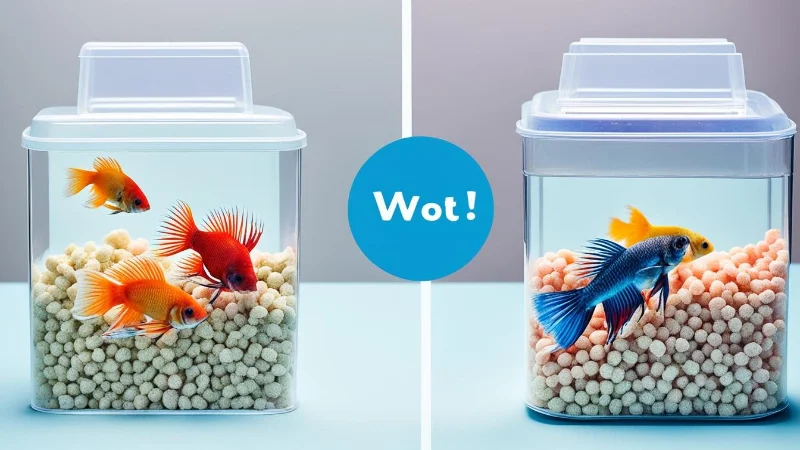
| Freeze-Dried Betta Fish Food | Frozen Betta Fish Food |
|---|---|
| Convenience and long shelf life | More natural and varied diet |
| Lightweight and easy to store | Closely mimics natural prey |
| Possible nutrient deficiency | Requires freezer space and thawing |
Exploring the Benefits of Organic Betta Food
Organic betta food offers several benefits for your betta fish. Organic options are made from high-quality ingredients without the use of artificial additives or chemicals. They provide a more natural and nutritious diet for your betta and can contribute to their overall health and well-being.
Organic betta food is made from carefully selected ingredients that are grown without the use of synthetic pesticides or fertilizers. This ensures that the food is free from harmful chemicals that could potentially affect the health of your betta fish.
By feeding your betta organic food, you can provide them with a diet that closely resembles what they would eat in their natural habitat. This can help promote their natural behavior and improve their overall well-being.
One of the main benefits of organic betta food is its nutritional value. Organic options are often made from high-quality proteins and other nutrient-rich ingredients. These ingredients are carefully selected to provide your betta with the essential vitamins, minerals, and amino acids they need for optimal health.
Organic betta food can also contribute to improved digestion and nutrient absorption. The absence of artificial additives and chemicals allows your betta’s digestive system to function more efficiently, ensuring they receive the maximum benefit from their food.
In addition to the benefits for your betta fish, choosing organic betta food also has positive environmental impacts. Organic farming practices promote sustainable agriculture and reduce the use of harmful chemicals that can pollute waterways and harm other aquatic life.
When selecting organic betta food, look for products that are certified organic by reputable organizations. This certification ensures that the food has met strict standards for organic production.
By opting for organic betta food, you can provide your betta fish with a wholesome and nutritious diet while supporting sustainable and environmentally friendly practices.
Deciphering Betta Food Brands and Labels
When shopping for betta food, it’s important to decipher the labels and understand the nutritional information provided. Look for reputable and high-quality betta food brands that prioritize the health and well-being of betta fish. Pay attention to the ingredients, guaranteed analysis, and expiration dates to ensure you are providing your betta with the best possible food.
Identifying High-Quality Betta Food Brands
When choosing betta food, it’s essential to opt for high-quality brands that have a good reputation in the industry. Look for brands that prioritize the health and well-being of betta fish and use top-notch ingredients. Some well-known betta food brands that are highly regarded include:
- Tetra Betta.
- Hikari Betta Bio-Gold.
- Omega One Betta Buffet Pellets.
- New Life Spectrum Betta Formula.
- NorthFin Betta Bits.
These brands have been trusted by betta fish owners and have a track record of producing high-quality betta food.
Understanding Nutritional Information and Expiration Dates
When analyzing betta food labels, it’s important to understand the nutritional information provided. Look for labels that clearly outline the ingredients used and the guaranteed analysis of the food. This information will give you insights into the protein content, fat content, and other essential nutrients present in the food.
Additionally, pay attention to the expiration dates on betta food. Feeding your betta expired food can be detrimental to their health. Ensure that the food you purchase is within its shelf life and hasn’t expired.
Feeding Your Betta: Portion Sizes and Frequency
Feeding your betta fish the right portion sizes and at the appropriate frequency is essential for their health. Overfeeding can lead to obesity and health issues, while underfeeding can result in malnutrition. To ensure your betta fish receives proper nutrition, it’s important to follow a feeding guide and adjust portion sizes based on their individual needs.
When it comes to feeding frequency, bettas should be fed small meals multiple times a day rather than large meals all at once. This mimics their natural feeding behavior in the wild and helps prevent overeating. Aim for feeding your betta fish 2-3 times a day, spacing out the meals evenly.
It’s also important to establish a feeding schedule to maintain consistency. Betta fish thrive on routine, and having a consistent feeding schedule helps prevent digestive issues and keeps them healthy. Choose specific times of the day to feed your betta and stick to the schedule as closely as possible.
By following a betta fish feeding guide, adjusting portion sizes based on their individual needs, and establishing a regular feeding schedule, you can ensure your betta fish receives the right amount of food for optimal health and well-being.
Conclusion
In conclusion, selecting the best food for your betta fish is vital to their overall health and well-being. By understanding their dietary requirements and exploring different options, you can ensure that your betta fish receives the nutrition it needs.
Summarizing the Key Points on Betta Food
Firstly, it’s important to note that betta fish are carnivorous by nature and require a diet rich in protein. Replicating their natural diet by providing high-quality betta pellets and live foods such as blackworms and brine shrimp is beneficial.
Secondly, when selecting betta food, it’s crucial to evaluate the ingredients and prioritize those that promote optimal health. Look for pellets containing high-quality proteins like krill or whole fish.
Lastly, deciphering betta food labels and understanding the nutritional information provided is essential. Paying attention to expiration dates and choosing reputable, high-quality betta food brands is the key to providing the best nutrition for your betta fish.
Final Recommendations for Betta Fish Care
In addition to choosing the right food, it’s important to establish a feeding schedule and stick to appropriate portion sizes. Overfeeding can lead to obesity, while underfeeding can result in malnutrition. Following a betta fish feeding guide and adjusting portion sizes based on your betta’s individual needs will help maintain their health.
Lastly, observe your betta fish closely to ensure they are thriving on their chosen diet. If you notice any signs of health issues or dietary deficiencies, consult a veterinarian who specializes in fish care.
By considering these key points and following the recommendations provided, you can provide your betta fish with the best nutrition and care, ensuring its health and vitality for years to come.
